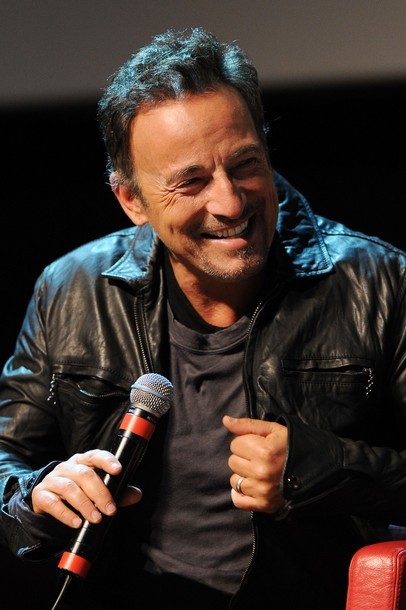So where does Bruce Springsteen's "Wrecking Ball" fit in?
OK, my problem with all of our beloved Brucie's 2000s albums--or, for that matter, just about anything since the last synth-soaked notes of "Dancing in the Dark"--was that it was all just so boring. Repetitive, complacent, punchless, boring. I can see it now--a gray-haired, spray-tanned Springsteen still wearing his schvanzola-compressing jeans from 1984, directing an E Street Band that has become less a band than a jobs program, saying, "OK boys, everybody come in on count 1, G-G-G-G. That's you, all seventeen acoustic guitars, the whole violin section--Max, make sure to use that annoying cymbal the whole time--and just sorta play noise till the end. And what the hell, throw in a C chord after the fifth chorus. Alright? Alright. I'm working on a dream..."
Whatever happened to the Springsteen who put a Gerschwinesque piano intro on the beginning of a 10-minute song just because he could? Who played "Kitty's Back" for 17 minutes at London in '75 and didn't repeat a single riff? Who avoided traditional song structure like the Plague? (See "Thundercrack".)
But the first thing you hear on "Wrecking Ball" is a freakin' disco-synth (followed by three minutes of scrambled metaphors and liberal pseudo-weltschmirtz) succeeded by penny-whistles, electronic drums, gospel choirs, horn sections, proletarianistic whistling numbers, a loop of the "I'm a soool-diiier" rant, not to mention a downright gangsta sixteen-bar rap on "Rocky Ground", and what's this? Is that a break with ONE INSTRUMENT PLAYING AT A TIME?!?!?!?
All I can say is, at least he's trying again.
But seriously, we need to be open to Springsteen's musical exploration just like he is. I mean, he's not going to write another BTR. Or Darkness. Or The River. Or WIESS. Those were young men's records, and the dude's sixty-three. And as objectively viewed pieces of music, all this new stuff--yes, even the rapper--tends to work. Yes, you'll have to wade through more libbie naivete than at the recall petition signings outside my local pool, but after listening to Prezidizzle Obizzle's SOTU, I think we can handle a pasty-faced old rich guy singing about the "plight of the workin' man".
"Wrecking Ball" and "Land of Hope and Dreams" are pretty traditional E Street powerhouses, and "We Take Care of Our Own" is kinda BITUSA-sounding, but the rest of them don't even utilize E Street band members, and--dare I?--maybe that's a good thing. Maybe this new producer is a good thing. Maybe even the rap influences. I think the ESB had turned from a tight, lean, muscular musical machine to a bloated, overarranged headache-inducer. From what I know, there weren't any set guidelines for what WB should sound like, and we wound up with a diverse, varied, ambitious, daring collection of songs.
But can we really say Bruce is resurgent? I've always said the Boss was a tried-and-true ballad singer, and "Jack of All Trades", "This Depression", and "You've Got It" are all snoozers. The stuff that hits home is the uptempo, folky, celtic, even hip-hoppy stuff that you've gotta view not as traditional E Street anthems, but as if you didn't know it was the same guy who wrote "Rosalita".
You'll notice that the title track and the penultimate song (which is graced with the last appearance of The Big Man) are the closest thing to "Badlands" and "The Promised Land" you'll see here. And they just don't measure up. He ain't got "It ain't no sin/to be glad you're alive" in him no more. But here, we see an old man finding his subject matter again--pondering mortality, age, death, what a good life is, what a bad life is, etc. He's gone from yearning to reflection, from the songs being a vehicle for the lyrics to the lyrics being a part of the songs. No, it's no "Jungleland", but it shows us that we may just have a live fish floppin' around on the grill.


No comments:
Post a Comment